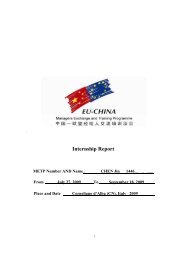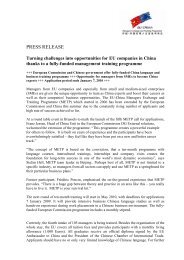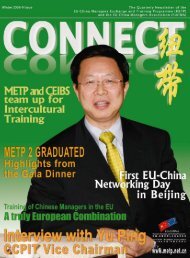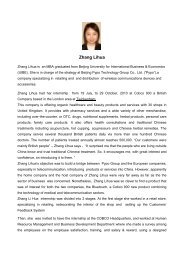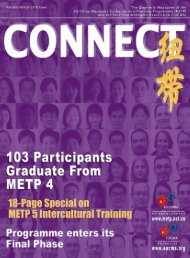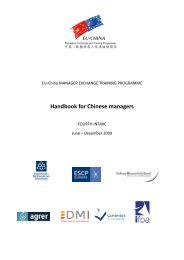Download - EU-China Managers Exchange and Training Programme
Download - EU-China Managers Exchange and Training Programme
Download - EU-China Managers Exchange and Training Programme
Create successful ePaper yourself
Turn your PDF publications into a flip-book with our unique Google optimized e-Paper software.
A<br />
<strong>EU</strong>CMA<br />
<strong>EU</strong>CMA<br />
The engineering technology firm ABB has an ESCO practice in<br />
Beijing which conducted a pilot ESCO project for a paper mill. “We<br />
focused on introducing a systematic energy strategy, carrying out<br />
on-site work flow <strong>and</strong> energy analysis, from which we produced a<br />
feasibility study <strong>and</strong> recommendations for reducing energy use,”<br />
says Jiang Haibo, country service manager <strong>and</strong> vice president for<br />
ABB <strong>China</strong>.<br />
ABB's project is a flagship installation to help build its ESCO<br />
practice in <strong>China</strong>. Yet, while international engineering firms such as<br />
Honeywell <strong>and</strong> ABB have been carrying out ESCO projects in <strong>China</strong><br />
for some time, there is now a growing domestic industry.<br />
Dongying Shengdong EMC (DSE) is an ESCO that installs electricity-producing<br />
boilers that burn waste gases such as coal mine<br />
methane or waste gas from coking plants. Clients provide waste gas<br />
to act as a feedstock, <strong>and</strong> buy the on-site electricity from DSE at a<br />
lower cost than grid electricity. Revenue-sharing arrangements, usually<br />
lasting 10 years, enable DSE to recoup its capital in about two<br />
years, <strong>and</strong> then maintain a profitable operation <strong>and</strong> maintenance<br />
relationship for the remainder of the contract.<br />
The biggest problem for ESCOs doing business in <strong>China</strong>,<br />
however, is getting hold of the capital to carry out an energy efficiency<br />
project. The size of typical ESCO loans is often too small to<br />
be worthwhile to Chinese banks; loan amounts usually range from<br />
USD 1 million to 6 million, which is much smaller than the large<br />
infrastructure projects <strong>and</strong> production expansion loans that loan<br />
officers typically appraise. Instead, ESCOs must lend their own<br />
money, or find investment funds elsewhere, which is often difficult<br />
for smaller Chinese firms with limited financial expertise.<br />
Stephane Gr<strong>and</strong> places an emphasis on international collaboration<br />
to stimulate <strong>China</strong>'s ESCO market. “The potential in <strong>China</strong>'s<br />
energy efficient market is large but in need of partnership from<br />
overseas firms who can introduce both technology <strong>and</strong> funding,” he<br />
says. Gr<strong>and</strong> focuses on the industrial sector, “such as the overhaul<br />
of existing equipment like boilers <strong>and</strong> mechanical <strong>and</strong> electrical<br />
systems.” He warns, however, that projects must be “pooled together<br />
to make them attractive to investors.”<br />
Development institutions have sought to make the Chinese<br />
ESCO industry attractive to investors through loan guarantees,<br />
financial <strong>and</strong> technical assistance to banks <strong>and</strong> ESCO companies,<br />
<strong>EU</strong>CMA<br />
as well as helping to bundle up ESCO projects to reduce loan<br />
transaction costs. A USD 200 million World Bank loan together<br />
with a USD 13 million Global Environment Facility grant is the<br />
basis for a program to train Chinese banks for ESCO lending <strong>and</strong><br />
partly guarantee ESCO loans. In addition, a joint effort between<br />
the US Environmental Protection Agency <strong>and</strong> the Chinese State Environmental<br />
Protection Administration is helping Hong Kong-based<br />
ESCOs pursue opportunities in the Chinese mainl<strong>and</strong> through loan<br />
guarantees from the Asian Development Bank. The International<br />
Finance Corporation manages a fund that guarantees non-stateowned<br />
Chinese banks that they will not lose more than 25% of their<br />
loans for the first ESCO projects.<br />
However, despite the considerable work done by these institutions,<br />
<strong>China</strong>'s ESCO industry is still worth fewer than USD 1 billion<br />
dollars a year.<br />
One Chinese manager for an international company, who<br />
asked to remain anonymous, expressed doubt about whether the<br />
traditional ESCO model was the right one for <strong>China</strong>. “Chinese<br />
companies have had their expectations raised to the wrong level.<br />
They want an ESCO company to come along with the money <strong>and</strong><br />
technology in h<strong>and</strong>, wave a magic w<strong>and</strong> <strong>and</strong> save energy. In any<br />
country, an ESCO project needs a serious investment of time <strong>and</strong><br />
effort from the customer, but in <strong>China</strong>, with all the cultural <strong>and</strong><br />
structural barriers in place, customers must work twice as hard.” His<br />
suggestion is that <strong>China</strong> needs a localized model. “Customers could<br />
offer to guarantee loans, or partially finance ESCO projects themselves,”<br />
he says. “ESCOs need to have worked with the company<br />
before to build underst<strong>and</strong>ing <strong>and</strong> strong trust before attempting a<br />
full-service ESCO project.”<br />
<strong>China</strong>'s ESCO market is a useful proxy for <strong>China</strong>'s economic<br />
development. Whether it will take off depends on the extent to<br />
which <strong>China</strong> can develop sophisticated market institutions <strong>and</strong><br />
capabilities; whether Chinese companies can capture the fullservice<br />
capabilities of their American <strong>and</strong> European counterparts;<br />
<strong>and</strong> whether ESCOs can adjust their contracting methodologies for<br />
the Chinese market. To a large extent, the likelihood that <strong>China</strong><br />
can develop from a low-cost manufacturing economy to a high<br />
technology <strong>and</strong> knowledge-based economy depends on many of<br />
these same factors.<br />
Tristan Edmondson graduated from London School of Economics<br />
<strong>and</strong> Political Science. He is an entrepreneur with a background<br />
in international business, especially in <strong>China</strong>. His work experience<br />
has leant towards project management, research <strong>and</strong> sales<br />
where he has developed his communication skills. Currently Mr.<br />
Edmondson is a partner at Mint Research, a Beijing-based clean<br />
technology consultancy <strong>and</strong> works on projects including a market<br />
report on <strong>China</strong>'s Energy Service Company (ESCO) industry, a<br />
feasibility study for a solar farm <strong>and</strong> a CDM benchmark database<br />
project. (www.mintresearch.cn).<br />
Tristan Edmondson<br />
METP 3<br />
19



